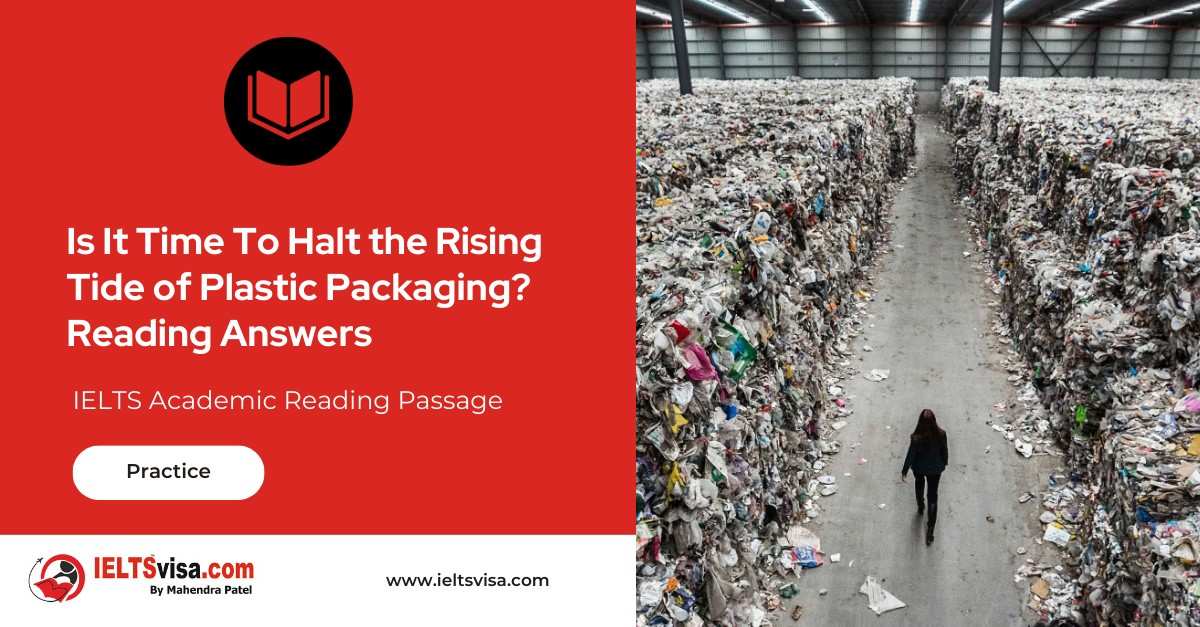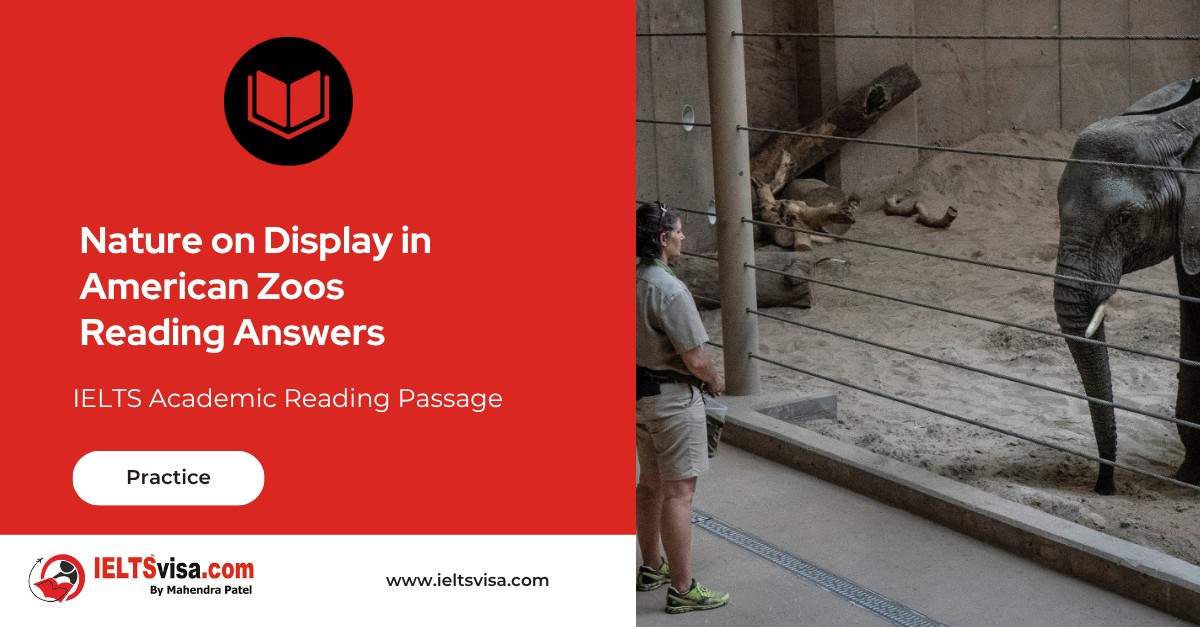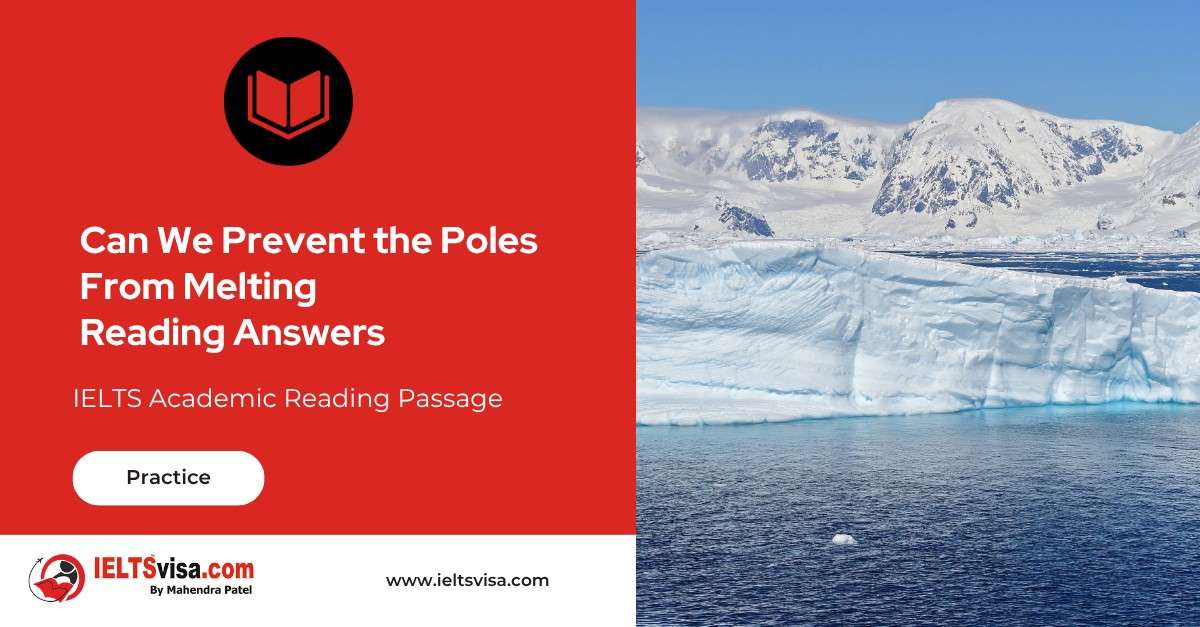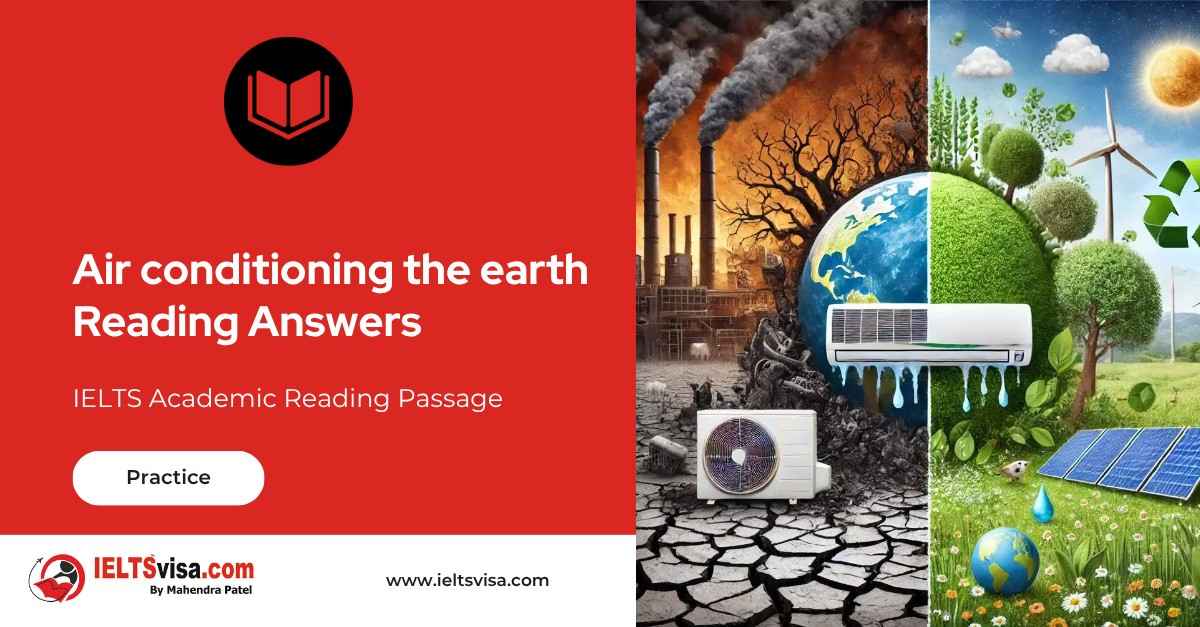Is It Time To Halt the Rising Tide of Plastic Packaging? Reading Answers
IELTS Academic Reading Passage
A. Close up, plastic packaging can be a marvellous thing. Those who make a living from it call it a forgotten infrastructure that allows modern urban life to exist. Plastics have helped society defy natural limits such as the seasons, the rotting of food and the distance most of us live from where our food is produced. And yet we do not like it. Partly we do not like waste, but plastic waste, with its hydrocarbon roots and industrial manufacture, is especially galling. In 2008, the UK, for example, produced around two million tonnes of plastic waste, twice as much as in the early 1990s. The very qualities of plastic – its cheapness, its indestructible aura – make it a reproachful symbol of an unsustainable way of life.
B. The facts, however, do not justify our unease. All plastics are, at least theoretically, recyclable. Plastic packaging makes up just 6 to 7 per cent of the contents of British dustbins by weight and less than 3 percent of landfills. Supermarkets and brands, which are under pressure to reduce the quantity of packaging of all types that they use, are finding good environmental reasons to turn to plastic: it is lighter, so requires less energy for transportation than glass, for example; it requires relatively little energy to produce, and it is often re-usable. An Austrian study found that if plastic packaging were removed from the tire supply chain, other packaging would have to increase fourfold to make up for it. So are we just wrong about plastic packaging?
C. Is it time to stop worrying and learn to love the disposable plastic wrapping around sandwiches? Certainly, there are bigger targets for environmental savings such as improving household insulation and energy emissions. Naturally, the tire plastics industry is keen to point them out. What’s more, concern over plastic packaging has produced a squall of conflicting initiatives from retailers, manufacturers, and local authorities. It’s a squall that dies down and then blows harder from one month to the next. ‘It is being left to the individual conscience and supermarkets playing the market,’ says Tim Lang, a professor specializing in food polio’. ‘It’s a mess.’
D. Dick Scarle of the Packaging Federation points out that societies without sophisticated packaging lose all their food before it reaches consumers and that in the UK, waste in supply chains is about 3 per cent. In India, it is more titan 50 per cent. The difference comes later: the British throw out 30 percent of the food they buy – an environmental cost in terms of emissions equivalent to a fifth of the cars on their roads. Packagers agree that cardboard, metals, and glass all have their good points, but there’s nothing quite like plastic. With more than 20 families of polymers to choose from and then sometimes blend, packaging designers and manufacturers have a limitless variety of qualities to play with.
E. But if there is one law of plastic that, in environmental terms at least, prevails over all others, it is this: a little goes a long way. This means, first, that plastic is relatively cheap to use – it represents just over one-third of the UK packaging market by value but it wraps more than half the total number of items bought. Second, it means that even though plastic encases about 53 per cent of products bought, it only makes up 20 per cent by weight of the packaging consumed. And in the packaging equation, weight is the main issue because the heavier something is, the more energy you expend moving it around. Because of this, righteous indignation against plastic can look foolish.
F. One store commissioned a study to find precise data on which had a less environmental impact: selling apples loose or ready-wrapped. Helene Roberts, head of packaging, explains that in fact, they found apples in fours on a tray covered by plastic film needed 27 per cent less packaging in transportation than those sold loose. Sieve Kelsey, a packaging designer, finds die debate frustrating. He argues that the hunger to do something quickly is diverting effort away from more complicated questions about how you truly alter supply chains. Rather than further reducing the weight of a plastic bottle, more thought should be given to how packaging can be recycled. Helene Roberts explains that their greatest packaging reduction came when the company switched to reusable plastic crates and stopped consuming 62,000 tonnes of cardboard boxes every year.
G. Plastic packaging is important, and it might provide a way of thinking about broader questions of sustainability. To target plastic on its own is to evade the complexity of the issues. There seems to be a universal eagerness to condemn plastic. Is this due to an inability to make the general changes in society that are really required? ‘Plastic as a lightweight food wrapper is now built-in as the logical thing,’ Lang says. ‘Does that make it an environmentally sound system of packaging? It only makes sense if you have a structure such as exists now. An environmentally-driven packaging system would look completely different’ Dick Scarle put the challenge another way. “The amount of packaging used today is a reflection of modern life.”
Questions 14-18
Reading Passage 2 has five paragraphs A-E.
Choose the correct heading for each paragraph, A-E from the list of headings below.
Write the correct number, i-viii in boxes 14-18 on your answer sheet.
List of Headings
I. A lack of consistent policy
II. Learning from experience
III. The greatest advantage
IV. The role of research
V. A unique material
VI. An irrational anxiety
VII. Avoiding the real challenges
VIII. A sign of things to come
- Paragraph A
- Paragraph B
- Paragraph C
- Paragraph D
- Paragraph E
Questions 19-23:
Look at the following statements (Questions 19-23) and the list of people below.
Match each statement to the correct person A-D.
Write the correct letter, A-D in boxes 19-23 on your answer sheet.
NB You may use any letter more than once.
19. A comparison of two approaches to packaging revealed an interesting result.
20. People are expected to do the right thing.
21. Most food reaches UK shops in good condition.
22. Complex issues are ignored in the search for speedy solutions.
23. It is merely because of the way societies operate that using plastic seems valid.
People
A. Tim Lang
B. Dick Seatle
C. Helene Roberts
D. Steve Kelsey
Questions 24-26:
Complete the summary below.
Write NO MORE THAN ONE WORD from the text for each answer.
Write your answers in boxes 24-26 on your answer sheet.
A revolutionary material
Plastic packaging has changed the way we consume food. However, we instinctively dislike it partly because it is the product of 24………………………… processes, but also because it seems to be 25………………………….so we feel it is wasteful. Nevertheless, it is thanks to plastic that for many people their choice of food is no longer restricted by the 26………………………. in which it is available or the location of its source.

Solution For: Is It Time To Halt the Rising Tide of Plastic Packaging? Reading Answers
Reading Answers
| 14 VI | 15 I |
| 16 V | 17 III |
| 18 VII | 19 C |
| 20 A | 21 B |
| 22 D | 23 A |
| 24 Industrial | 25 Indestructible |
| 26 Seasons |
Review and Practice
- Regularly practice with IELTS reading samples and time yourself to get used to the pressure of the exam.
- Review your mistakes to understand where you went wrong and how to avoid similar errors in the future.
Our Books
Master IELTS Speaking Part 1
IELTS Writing Task 1 Book
IELTS Writing Task 2 Book
Is It Time To Halt the Rising Tide of Plastic Packaging? Reading Answers Explanation
Comin Soon
Practice IELTS Other Modules
IELTS Listening
The IELTS Listening test assesses how well you can understand spoken English in various contexts. It lasts about 30 minutes and is divided into four sections with a total of 40 questions. The listening tasks become increasingly difficult as the test progresses.
IELTS Academic Reading
The IELTS Academic Reading section assesses your ability to understand and interpret a variety of texts in academic settings. It is designed to evaluate a range of reading skills, including skimming for gist, reading for main ideas, reading for detail, understanding inferences, and recognizing a writer's opinions and arguments.
IELTS Speaking
The IELTS Speaking test assesses your ability to communicate in English on everyday topics. It lasts 11-14 minutes and consists of three parts: introduction, cue card, and a discussion based on the cue card topic.
IELTS General Reading
IELTS General Reading tests your ability to understand and interpret various types of texts. Here are some key areas and types of content you can expect to encounter in the reading section, along with tips for effective preparation.
IELTS Academic Writing Task 1
In IELTS Academic Writing Task 1, you are presented with a visual representation of information, such as graphs, charts, tables, or diagrams, and you are required to summarize, compare, or explain the data in your own words.
IELTS General Writing Task 1
In IELTS General Writing Task 1, you are required to write a letter based on a given situation. The letter can be formal, semi-formal, or informal, depending on the prompt. Here’s a breakdown of the key components to include in your letter
IELTS Academic Writing Task 2
In IELTS Academic Writing Task 2, you are required to write an essay in response to a question or topic. Here’s a guide to help you understand the essential elements of this task
IELTS Exam Tips
To succeed in the IELTS exam, practice regularly, familiarize yourself with the test format, improve your vocabulary, develop time management skills, and take mock tests to build confidence.
Grammer for IELTS
Grammar is the foundation of effective communication in English. Understanding tense usage, subject-verb agreement, and sentence structure enhances clarity and coherence in writing and speaking.
Vocabulary for IELTS
Vocabulary plays a crucial role in the IELTS (International English Language Testing System) exam, especially in the Speaking and Writing sections. Here’s an overview of why vocabulary is important and how it impacts your performance
RECENT IELTS SAMPLES QUESTIONS AND ANSWERS
Walking with dinosaurs
Peter L. Falkingham and his colleagues at Manchester University are developing techniques that...
Money as the Unit of Amount Reading Answers
The most difficult aspect of money to understand is its function as a unit of account. In...
WEATHERING IN THE DESERT
In the deserts, as elsewhere, rocks at the earth's surface are changed by weathering, which...
Nature on Display in American Zoos
The first zoo in the United States opened in Philadelphia in 1874, followed by the Cincinnati...
Can We Prevent the Poles From Melting
Such is our dependence on fossil fuels, and such is the volume of carbon dioxide we have...
Air conditioning the earth reading answers
The circulation of air in the atmosphere is activated by convection, the transference of heat...













